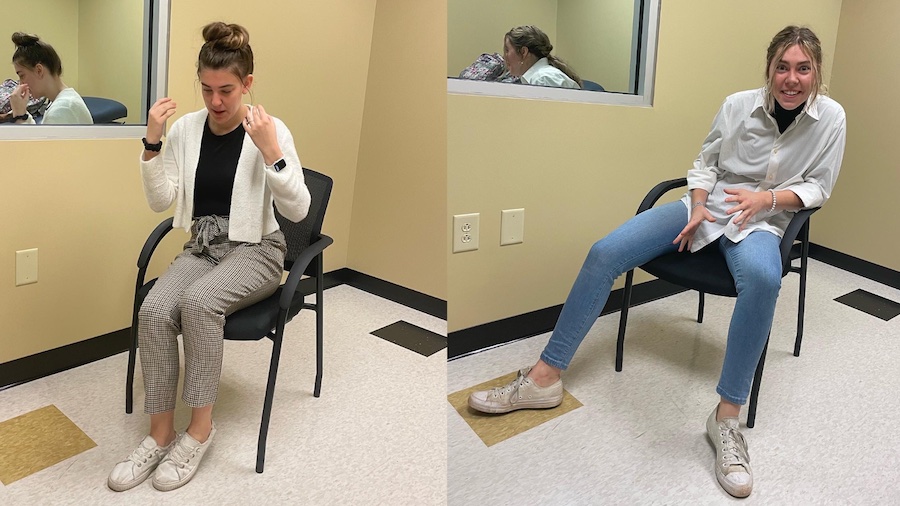As students in the Psychiatric Mental Health Nurse Practitioner Program at the Anderson University College of Health Professions prepare to step into mental health professional roles, they must learn to diagnose individuals in a wide variety of mental health scenarios.
When these students go through their intensives, they work with standardized patients—essentially individuals who act out the characteristics of a real patient. This gives students valuable experience interacting with a patient and coming up with a diagnosis.
When planning the most recent round of intensives for their students, College of Health Professions Assistant Professor of Graduate Nursing Dr. Bonnie Treado, along with Psychiatric Mental Health Nurse Practitioner Program Coordinator Dr. April Reese found a valuable resource that’s right on campus.
Dr. Treado reached out to Department of Theatre and Dance Chair Dr. David Sollish at the South Carolina School of the Arts at Anderson University, seeking theatre majors to portray patients.
Sophomore musical theatre major Kalyn Wright and sophomore acting major Samantha Venable were given case files of characters with medical histories and used them to play the patient and answer mock questions from psychiatry students. This involved improv and acting in a way that accurately reflected the patient’s diagnosis.
Dr. Reese said that nursing students interviewed the “patients” who acted out various mental disorders including schizophrenia, depression and anxiety. She noted that working with actors is an important part of evaluating nursing students’ interviewing and diagnostic skills. Drs. Reese and Treado also pointed out that being a standardized patient can also be a good career option for someone pursuing an acting career.
“I’m only a sophomore and I’m getting to do some of this stuff that I can add to my resumé and could be a future job for me,” said Wright, who portrayed a schizophrenia patient.
“It was definitely a good experience getting to do something that is so different from how I am as a person. I think that definitely helps in the acting world, but also required us to do a lot of improvisation,” said Venable, who portrayed an elderly woman going through depression and anxiety.
Dr. Treado hopes to see more theatre students become a part of training for psychiatric mental health nurse practitioner students and to see something similar used across all of the graduate nursing programs.
“When we are working with these theatre students, not only are we giving them a chance to build their resumé and improving the diagnostic capability of our students in the graduate program of nursing, but we’re also building capacity for future relationships between undergraduate and graduate, between the College of Health Professions and the South Carolina School of the Arts,” Dr. Treado said.
“I think that’s very important because we want to be sending out our healthcare workers as prepared as we can. Doing something like this allows them to have that experience, so when they go into their field of study and it’s the real deal, they’re going to be prepared,” said Wright.
“I’m pleased that our School of the Arts Theater students can support our educational processes in the College of Health Professions,” said Anderson University College of Health Professions Dean, Dr. Donald Peace. “The use of standardized patients has supported medical education since the mid 1960s. Standardized patients clearly enable our faculty to objectively measure our student’s understanding of clinical conditions and provide a means of patient medical management.”
Dr. Sollish commented, “It is very important to me, as Chair of Theatre and Dance, for us to continue to work across campus and across disciplines. The Lord has given so many gifts to our students and faculty and we want to use those gifts in helping other programs. I want to thank Dr. Treado and Dr. Reese for such a great partnership and one I look forward to growing for years to come.”

